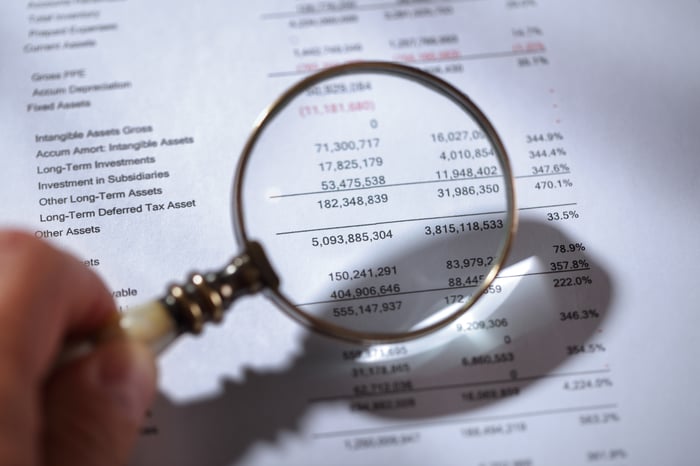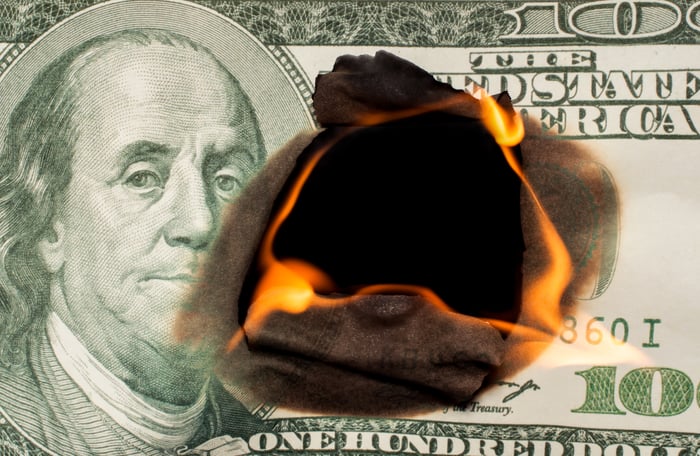
Image source: Getty Images.
Healthcare conglomerate Johnson & Johnson (JNJ 0.29%) is arguably one of the most revered, and steadiest, of publicly traded companies in the United States. It's also, like every other company on planet Earth, not absolved from making a mistake from time to time.
On Thursday morning, Johnson & Johnson announced that it would be paying $280 per share to acquire Swiss drugmaker Actelion (NASDAQOTH: ALIOF) in an all-cash deal, which will be funded by some of J&J's cash hoard currently being held outside the United States. In dollar value, this works out to approximately $30 billion.
Also, prior to the completion of the deal, Actelion will spin off its early-stage pipeline assets into a separate entity that will be publicly traded. Johnson & Johnson will have a 16% stake in this new entity, along with a debenture giving it the right to purchase an additional 16% stake in the future.
The deal probably comes as little surprise to those on Wall Street because J&J has always been active in the merger and acquisition column (albeit J&J usually targets small- and mid-sized companies as opposed to large caps), and it's been courting Actelion for a few months. Johnson & Johnson's interest in Actelion first became known in November when it reportedly offered $26 billion, which was rebutted by Actelion's board of directors as being too low. After increasing its bid to roughly $27 billion, J&J walked away.
However, just a few weeks later, J&J was back in the mix after talks between Actelion and French drug giant Sanofi went nowhere. On Thursday, J&J's management team landed its prize.

Image source: Getty Images.
Remicade weakness spurs J&J into action
The reason Johnson & Johnson was so aggressively pursuing Actelion is twofold. First, the company's best-selling drug, Remicade, an anti-inflammatory therapy, is now facing biosimilar competition from Celltrion's Inflectra. Celltrion licensed Inflectra to global drug giant Pfizer, which is marketing the biosimilar product at a 15% discount to Remicade's list price.
During the fourth quarter, Remicade's sales dipped by nearly 2% in the U.S. and by 39% on an export basis, leading to a drop of 3.2% on an operating basis (i.e., excluding currency moves). With $6.97 billion in sales, Remicade made up close to 10% of J&J's $71.9 billion in full-year sales. A reduction in Remicade sales could be tough to immediately replace.
Acquiring Actelion will allow Johnson & Johnson access to Actelion's market share-leading pulmonary arterial hypertension (PAH) drug portfolio, complete with potential blockbusters Opsumit and Uptravi. The deal is expected to be immediately accretive to J&J's full-year EPS and improve its long-term growth rate.
The other factor that likely coerced J&J into such a large deal is the expectation of slower pharmaceutical growth in 2017. Johnson & Johnson recently announced that it plans to make its drug-price increases public information by mid-February in an effort to win over consumers' trust and allow the public (and regulators) a better understanding of why it prices drugs the way it does.
It could, however, also reduce J&J's pricing power in the near term as all eyes focus on J&J's pricing strategy. Coupled with President Trump's implication that he would reduce drug prices during his term, J&J is in need of new sources of pharmaceutical growth. Let's also not forget that pharmaceuticals are J&J's primary source of operating margin and growth.
Buying Actelion provides J&J with that immediate infusion of near-term growth, and it'll also likely boost the company's pharmaceutical revenue to nearly half of its annual sales.

Image source; Getty Images.
J&J may never recoup its costs from this deal
Though J&J's management team hailed the deal as great for its shareholders, and Actelion's shareholders have to be licking their chops, it would be my contention that J&J may never recoup the $30 billion it's forking over to acquire Actelion's PAH portfolio.
Johnson & Johnson's eagerness to acquire Actelion overlooks a number of key questions that haven't been answered with Actelion's product portfolio and pipeline. For example, the company is currently paying about 15 times sales, or somewhere in the neighborhood of six to seven times peak sales, for Actelion. But these peak sales estimates assume that Opsumit and Uptravi hit on all cylinders.
Just a few days ago, Opsumit failed to hit its primary endpoint in a pivotal phase 3 trial in patients with Eisenmenger syndrome. While this was merely a label expansion opportunity for Opsumit, it now means $100 million to $200 million that can be excluded in peak annual sales. In terms of deal value, that's a $600 million to $1.2 billion swing at six times peak annual sales.
Extrapolating out Opsumit and Uptravi's Q3 sales figures, each drug is on track to generate $872 million and $280 million, respectively, over 12 months. Even though they're both growing -- Uptravi was only launched a year ago -- that's still a far cry from the roughly $2 billion in peak annual sales expected of each drug.
What's more, the company's top-selling PAH drug, Tracleer, has lost its patent exclusivity and is facing generic competition. Sales of the drug were down 18% on a constant-currency basis in the third quarter, and they've fallen by $144 million through the first nine months of fiscal 2016. Generic drugs have a habit of gobbling up around 50% of branded-drug sales within a year, meaning Tracleer's projected $1.0 billion to $1.1 billion in sales in 2016 could dip to around $500 million annually, or less, in short order. That's a tough pill for J&J to absorb.

Image source: Getty Images.
But the real kick in the behind for J&J's shareholders is that they only wound up with 16% of Actelion's early-stage pipeline -- 32% if it chooses to exercise its option to acquire more. To be clear, there were a bounty of question marks surrounding Actelion's pipeline, but it could have at least given J&J's shareholders some glimmer of hope that J&J would wind up getting the better of this deal over the long term. With such minuscule ownership in the R&D Company, J&J sealed its fate, in this Fool's opinion, as making a bad deal.
Based on the $252 million in net income during Q3 for Actelion, it's only bringing about $1 billion, perhaps a tad more, in annual net income to the table for J&J. Assuming it grows Opsumit and Uptravi, perhaps $2 billion in annual net income, or a tad more, is possible. Still, that would entail more than a decade for J&J to recoup its $30 billion cost, and by then, generic drugs or competitors may well have entered the PAH space.
Thankfully, J&J is a strong and diverse enough company to thrive regardless of this deal. But consider this Fool quite skeptical of the price tag of this deal.





